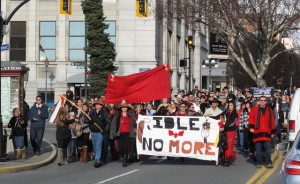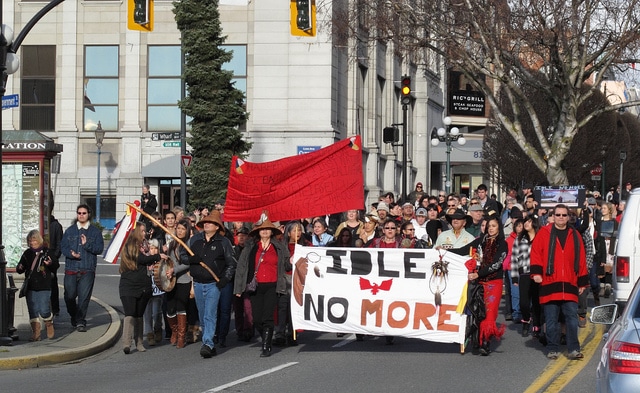The Idle No More movement has moved into a new phase. The large marches and flash mobs have largely passed though some of this kind of activity remains. The movement has become more introspective, more focused on change at the community level, and on the broader education of Canadian society. I cannot speak to the Idle No More movement as I am not one of the movement’s organizers or spokespersons. What I can do is make some observations that I hope will put the movement into some broader context.

First off, let me say that as my cousin Atik Bird points out, Indigenous people have not been idle. For many generations Indigenous people have sought broader integration into Canadian society, specifically in terms of the equality of outcomes achieved by non-Indigenous people. These efforts have in large measure been unsuccessful. First Nations communities are statistically more prone to teen suicide, experience higher rates of crime, endemic lack of housing, little access to education beyond the primary years, and lack of potable water in many of our communities. First Nations people are over represented in prisons and underrepresented in the economy. Under these conditions, First Nations people face poorer outcomes in terms of health, education, wealth, and social status when compared to their settler counterparts.
But it wasn’t always this way. Prior to the arrival of the settler people, Indigenous people lived good lives. Hard lives to be sure, and lives in which there was conflict and lean times and hard choices. But it is also perfectly clear to me that my ancestors, like those of other Indigenous communities, possess extremely well developed political and moral philosophies, cosmologies, epistemologies and a relationship with the world around us – the web of relations. I simply cannot accept a line of thinking that assumes that given a ten thousand year history on this land, our people did little more than hunt and gather and sleep. We thought about things, about the world around us and our place in that world. We had rules, and laws and norms, and these all had to be justified, and they developed over time. And these are not the political philosophies of a bygone era. As John Mohawk has written, the political and moral philosophy of Indigenous communities “deserves to be judged on its own merits, not as an artifact of the past. We should investigate (that philosophy) today, question it, expand upon it, learn from it just as we would from any other doctrine of political thought. It will stand against that kind of scrutiny.”
And our stories and teachings are relevant in our contemporary time. Rick Monture has written that our ancestors “faced the collapse of their society several times, and addressed the presence of negative and difficult people amongst our own long before the settlers arrived …. We therefore need to set our minds to this task once again, not relying on the government for meaningless apologies or offers of reconciliation, but upon our own faith in the resilience learned from ancient narratives of past conflict and re empowerment.”
Indigenous moral and political philosophies are, in other words, rich sources of knowledge for contemporary persons, both Indigenous and settler.
Westerners often forget how young they are as a culture, and how new are the pillars of their intellectual and political worlds. The nation state and its centrality as the basic unit of international relations and sovereignty dates from the Treaty of Westphalia in 1648, some six years before the death of Galileo whose works continued to be banned until in 1718. In other words the broad and public acceptance of science and the nation state are some 350 years old, a mere blip on the spectrum of time since my people have been thinking through their philosophic and intellectual traditions.
Like Professor Monture, I believe that our political and moral philosophies are robust, and adequate to the challenge our communities face today. That said, the challenges we face today are vast and unparalleled. The legacies of the residential school system include substance abuse, addiction, and broken families. Our communities are impoverished with little access to capital or any easy way to make economic gains. Our youth are the fastest growing demographic in the country, but we lack schools, housing and clean water. Suicide is endemic, and we are vastly over represented in the prison system. The future can look pretty bleak, and the challenges insurmountable.
But, language can help. Language puts our people’s current situation into perspective. Time, for example, is on our side, because, in at least some of our languages, time is circular, not linear and so we aren’t racing against a clock, we are where we will be again, and where we have been before. In the Blackfoot language there is a word for today, tomorrow and the day after tomorrow, and then yesterday, and the day before yesterday. After that, the word for three days from now, and three days in the past is the same word. Time turns in on itself. Everything that will ever happen will happen in the next two days, and the ancient ancestors are themselves only three days into the past. Thus, in Blackfoot, the stories that are told are not ancient stories, they are recent history, and their teachings are contemporary.
In the Cree language of my communities, we have a word for me, a word for my mother, a word for my grandmother, and another for my great grand mother. And there is also a word for my daughter, and grand daughter and great grand daughter, and after that it’s the same word for relations not yet born, or born more than three generations ago. Cree people live in a seven generation cycle in which they are always the middle generation, always looking out for the generations to come, always alive with the ancestors of the past as they cycle into the generations still to come.
Of course, the greatest challenge that Indigenous people face is that we are no longer here alone. The settler people are here to stay, and we live along side, and among them. Language may help here too, if only because language helps to lay bare the different conceptions of community institutions like health care and government. The English word health is translated from Cree to mean “being alive well”. To be healthy is to be alive well, but the Cree conception of health, of being alive well, is not a disease based paradigm. The concept of being alive well is one that considers the health of the land itself, and the ability of Cree people to be on the land, to eat what the earth provides, and to steward over the earth herself. So, understanding that Cree conceptions of health are not necessarily human based concepts can deepen the settler understanding of what it is to be Cree, and what it is we mean when we say we want access to health care, and we need control over our lands. The two concepts of human health and the health of the land are intertwined.
The Cree word for government translates into English as ‘knowing how to take care of ourselves.’ It is an extremely useful concept in Cree, denoting as it does that government is about the care of the people, and the people’s own knowledge of how to do so. But this is an uneasy fit with the English term government, or the more abstract and frankly nonsensical term ‘self-government’. There is a lot of ground between ideas like sovereignty and knowing how to take care of ourselves at least in the popular and academic discourse of today.
What is clear to me is that whatever is meant by self-government, or sovereignty, and by whatever means those things can be achieved, we will still find ourselves in a relationship with the settler people. As Chief Justice Lamer famously opined, “Let’s face it, we are all here to stay.”
So the question is in a very real sense, not only what is it to be alive well, or to know how to take care of ourselves, but how can we do this together with the settler people. How can we carve out an overlapping consensus of ideas and ideologies, politics and policies that represent a just society, and a just relationship?
We cannot ignore the fact that our Indigenous histories also teach us how to live with others, how to enter into rightful relations with those who choose to enter into our web of relations. We must look to our own Indigenous histories, to our languages and to our philosophies and metaphors. The two-row wampum speaks to a relationship of two canoes, neither steering the other, but we cannot look past the fact that we share the river, and the river is part of the relationship that we have with the settler people.
And so, given that we are all here to stay, the question becomes how do we stay here bound together in the same river for next seven generations? And how do we translate our words and values into useful metaphors, explanations and agreements. Our entire world may turn on the answer to these questions as the water in the great lakes is depleted, as the oil sands turn out more and more carbon and poison the river systems. I will say only this: there is in Cree no set of words capable of explaining to a grandchild that ‘it was good for the economy.’






